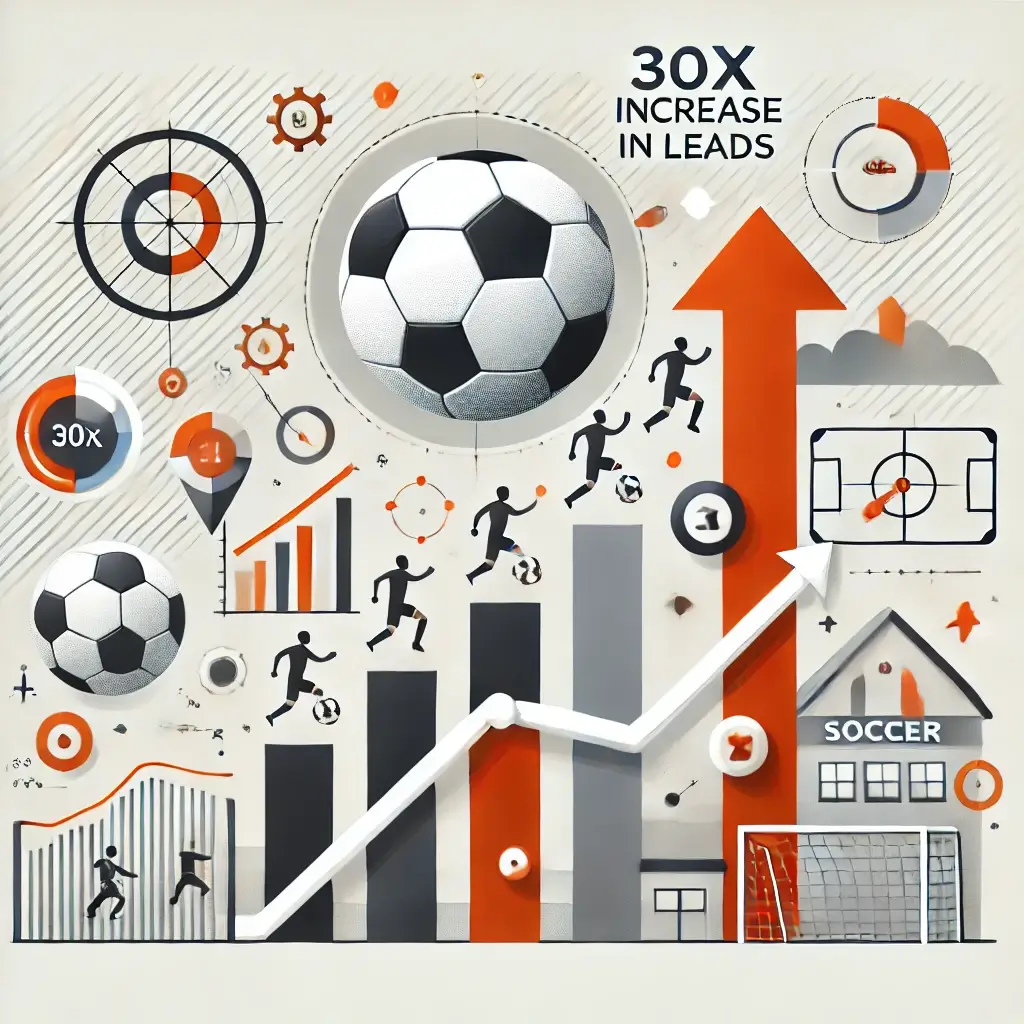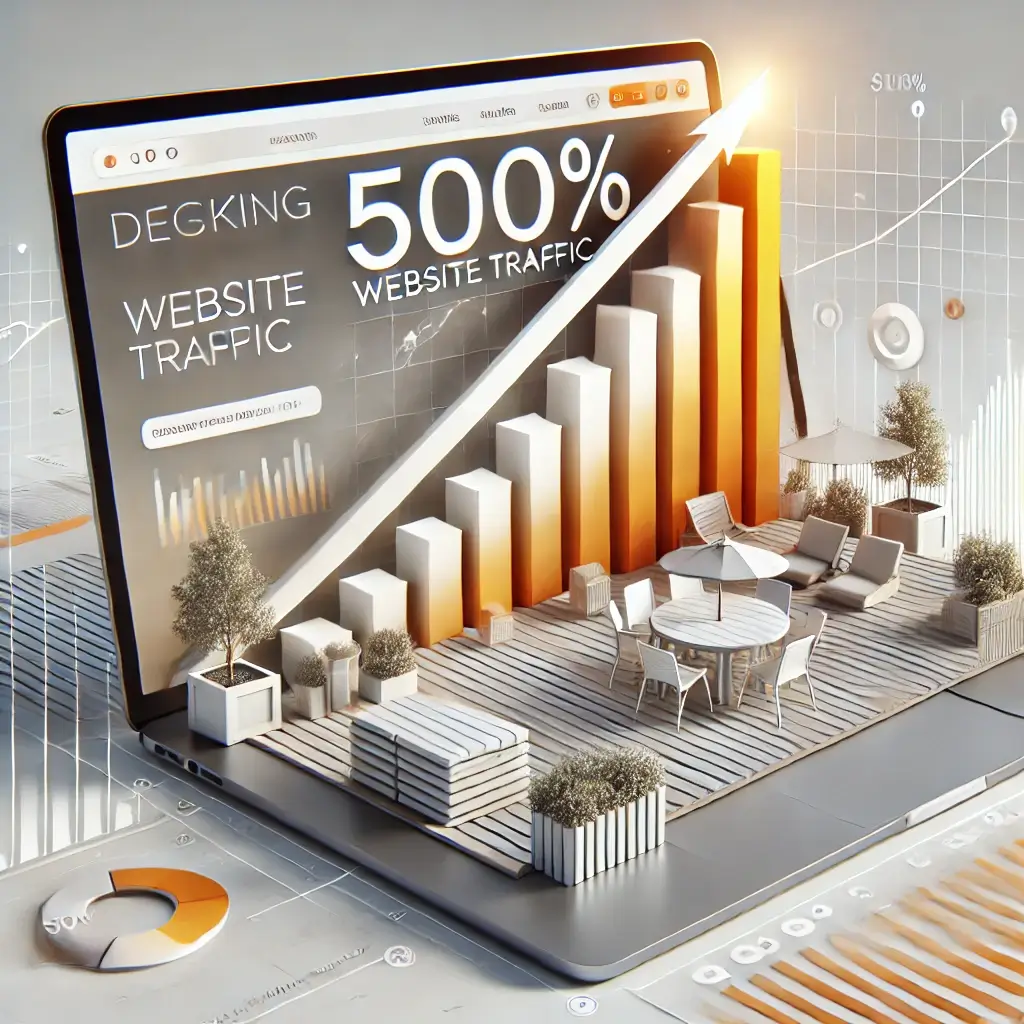Turning Clicks Into Customers
Digital Marketing Solutions That Scale Your Business Profitably
Digital Marketing Solutions That Scale Your Business Profitably
Let’s build a data-driven strategy that delivers measurable results. Schedule a consultation today!

What's your thought?

Awesome! 5X begins here!
Please enter your details

"That’s disappointing, but understood."
Feel free to reach out when you're ready to grow.
Trusted by 1,000+ Brands as their preferred Digital Marketing agency in Mumbai. Chosen for One Reason: Results.










Struggling to Achieve Tangible ROI from Digital Marketing?
Here’s Why Your Current Strategy Isn’t Working
Digital marketing can be your most powerful growth engine—but only if done right. Many businesses waste resources on outdated tactics, disjointed strategies, or lackluster execution. The result? Low visibility, wasted ad spend, and minimal returns.
In a hyper-competitive digital world, generic approaches fall flat. Without a clear, optimized, and data-driven strategy, your brand risks losing out to competitors who are capturing your market share.
Imagine campaigns that attract the wrong audience, content that fails to convert, or ad budgets spent with no accountability. These pitfalls cost businesses more than just money; they cost trust, opportunities, and growth.
At Syspree, we address these challenges with precision, delivering campaigns that connect, convert, and scale.
Common Challenges Businesses Face
Inefficient Ad Spend
Budgets drain quickly with little to no returns.
Low Search Visibility
Competitors outrank your business for vital keywords.
Poor Engagement Rates
Content struggles to resonate and drive action.
Siloed Marketing Channels
Lack of integration leads to disjointed efforts.
Transform Your Digital Presence with Tailored Strategies
Achieve More with Syspree’s Proven Framework
Syspree’s digital marketing services are built on our CORE Framework—Consult, Optimize, Reinforce, Excel. This systematic approach ensures your campaigns not only reach the right audience but deliver measurable results. From SEO and social media to paid ads and email marketing, our solutions are data-driven, scalable, and results-focused.

Consult
Strategy creation tailored to your goals.

Optimize
Refine campaigns for peak performance.

Reinforce
Strengthen visibility and brand presence.

Excel
Achieve sustainable growth and profitability.

Consult
Strategy creation tailored to your goals.

Optimize
Refine campaigns for peak performance.

Reinforce
Strengthen visibility and brand presence.

Excel
Achieve sustainable growth and profitability.

Optimize
Refine campaigns for peak performance.

Consult
Strategy creation tailored to your goals.

Reinforce
Strengthen visibility and brand presence.

Excel
Achieve sustainable growth and profitability.
Testimonials
What Our Clients Achieved with Us





Our Capabilities
Comprehensive Digital Marketing Services
Explore Other Services
Websites That Deliver Real Results
Success Stories That Inspire Confidence
From doubling conversions to reducing bounce rates, Syspree’s websites consistently deliver results. Check out our case studies for in-depth stories of businesses like yours achieving success.
Tailored Designs for Your Unique Needs
Solutions for Every Industry
Our Global Presence
Countries We are Present In

Fueling Growth Through Data Excellence
Proven Success in Numbers
OUR LEADERSHIP


Our leadership ensures Syspree delivers innovation and measurable results through expert website design and development strategies.
OUR TEAM























Our skilled team combines creativity with precision, building websites that deliver exceptional user experiences and business results
CASE STUDIES
Proven Results Across Industries
Explore how Syspree has helped businesses across industries achieve measurable growth with tailored digital marketing and web development strategies. From e-commerce to tech startups, our custom solutions deliver proven results that drive revenue, improve customer acquisition, and enhance brand visibility

CASE STUDIES
30 Times Surge in Leads within a year
Sports Coaching Company

CASE STUDIES
Astounding 800% Increase in FMCG Distributor’s Web Traffic in Just 13 Months!
FMCG Distributors

CASE STUDIES
500% Traffic boost in only 6 months
DECKING AND PATIO COMPANY

CASE STUDIES
Improve Your Traffic by 1400% In Just 2 months!
Immigration Company

CASE STUDIES
900% Traffic Surge in Just 1.5 Years
Holistic Lifestyle
e-commerce

CASE STUDIES
Double Leads for Accounting company in just 2 months
Accountants and corporate services
OUR EXPERTISE, YOUR KNOWLEDGE
Blogs, Podcasts,Vlogs

Success Stories: Turning Marketing Budgets into Profits with Syspree
We spread the KNOWLEDGE
Blogs, Podcasts,Vlogs
- All Posts
- : SaaS Web Design Strategy
- Abu Dhabi
- Adelaide
- Africa
- Ahmedabad
- AI & Innovation
- AI & Personalization
- AI & SaaS Personalization
- AI & Workforce Strategy
- AI Automation
- AI in E-commerce
- AI in SaaS Marketing
- AI in Technology
- AI in Technology Business
- AI Innovation in E-commerce
- AI Marketing
- AI Strategy
- AI Strategy in E-commerce
- AI Success Stories
- AI Success Stories in E-commerce
- AI Trends in the SaaS
- AI vs Human Strategy
- Ajman
- Analytics & CRO
- Artificial Intelligence
- Bahrain
- Belgium
- Bengaluru
- Birmingham
- Blogs
- Branding and Marketing Services blog
- Brazil
- Business Growth
- Canada
- Canberra
- chennai
- Chicago
- Consulting
- Consulting Business Growth
- Consulting Growth Stories
- Consulting Lead Generation
- Consulting Marketing
- Consulting Strategy
- Content Marketing
- Corporate Services
- Corporate Services Growth
- Custom Software
- Customer Support
- Cyber Security
- Data Management
- data privacy compliance
- Data Protection
- data protection strategies
- data security solutions
- Decking Business Digital Marketing
- Delhi
- Digital FnB Marketing
- Digital Marketing
- Digital marketing for Tech
- Digital Tourism Marketing
- E-commerce Consumer Behavior
- E-commerce Conversion Optimization
- E-commerce Digital Marketing
- E-commerce Growth Stories
- E-commerce IT Best Practices
- E-commerce IT Infrastructure
- E-commerce IT Security
- E-commerce IT Strategy
- E-commerce IT Success Stories
- E-commerce Lead Generation
- E-commerce Marketing
- E-commerce Marketing Analytics
- E-commerce Marketing Strategy
- E-commerce Marketing Success Stories
- E-commerce Outsourcing
- E-commerce Outsourcing Analysis
- E-commerce Outsourcing Risks
- E-commerce Outsourcing Strategy
- E-commerce Outsourcing Success Stories
- E-commerce Outsourcing Trends
- E-commerce SEO
- E-commerce Social Media Marketing
- E-commerce Success Stories
- E-commerce UX/UI
- E-commerce Web Design
- E-commerce Web Design Strategy
- E-commerce Web Design Trends
- Ecommerce
- Edinburgh
- Education
- Education Analytics
- Education Business Growth
- Education Business Models
- Education Growth Stories
- Education Growth Strategies
- Education Lead Generation
- Education Marketing
- Education Strategy
- FnB Brand Strategy
- FnB Business Growth
- FnB Business Models
- FnB Industry Trends
- FnB Lead Generation
- FnB Marketing Analysis
- FnB Performance Metrics
- FnB Sales Channels
- FnB Success Stories
- France
- Fujairah
- Future of AI
- Future of AI in E-commerce
- Future of E-commerce IT
- Future of E-commerce Marketing
- Future of E-commerce Outsourcing
- Future of Education
- Future of FnB
- Future of Healthcare
- Future of Hospitality
- Future of Interior Design
- Future of Renovation
- Future of SaaS
- Future of SaaS Marketing
- Future of SaaS Web Design
- Future of Tech Business
- Future of Technology IT
- Future of Technology Marketing
- Future of Technology Outsourcing
- Future of Technology Web Design
- Future of Tourism
- Future of Travel Industry
- Ghana
- Goa
- Google Ads
- Graphic designing
- Guides
- Healthcare
- Healthcare Analytics
- Healthcare Business Growth
- Healthcare Business Models
- Healthcare Growth Stories
- Healthcare Growth Strategies
- Healthcare Lead Generation
- Healthcare Marketing
- Healthcare Strategy
- HongKong
- Hospitality Brand Management
- Hospitality Business Growth
- Hospitality Business Models
- Hospitality Consumer Behavior
- Hospitality Distribution Strategy
- Hospitality Expansion Stories
- Hospitality Industry Trends
- Hospitality Lead Generation
- Hospitality Performance Metrics
- Hospitality Pricing Strategy
- Hospitality Success Stories
- Hyderabad
- Information Technology
- Interior Design Growth Stories
- Interior Design Lead Generation
- Interior Design Marketing
- Interior Design Strategy
- Interior Design Trends
- Ireland
- IT Services
- Job Post
- Kenya
- Lead Generation for Tech
- Lead Generation for Training Companies
- Leeds
- Logo Designing services blog
- London
- Los Angeles
- Malaysia
- Marketing and Sales
- Marketing Strategy for Tech
- Marketing Technology
- Melbourne
- Miamai
- Miami
- Middle East
- Mumbai
- Nepal
- Netherland
- New York
- New Zealand
- Oman
- Others
- Outsourcing
- Paid advertising
- Pay Per Click
- Perth
- Philippines
- Podcasts
- Portugal
- Pune
- Qatar
- Ras-Al-Khaimah
- Renovation Business Growth
- Renovation Growth Stories
- Renovation Lead Generation
- Renovation Marketing
- Renovation Strategy
- Renovation Trends
- Roundup
- SaaS
- SaaS AI Strategy
- SaaS AI Success Stories
- SaaS Business Growth
- SaaS Conversion Optimization
- SaaS Digital Marketing
- SaaS Growth Stories
- SaaS Growth Strategies
- SaaS Lead Generation
- SaaS Marketing Analytics
- SaaS Marketing Strategy
- SaaS Marketing Success Stories
- SaaS Marketing Trends
- SaaS Metrics and Analytics
- SaaS Pricing Strategy
- SaaS SEO
- SaaS Strategy
- SaaS Success Stories
- SaaS Trends
- SaaS UX/UI
- SaaS Web Design
- SaaS Web Design Trends
- Scaling & Expansion in Training Businesses
- SEO
- SEO & Search Marketing
- SEO Strategies
- Sharjah
- social media marketing
- Social Media Marketing
- Spain
- Sri-Lanka
- Surat
- Switzerland
- Sydney
- Syria
- SySpree
- Tanzania
- Tech Business Growth
- Tech Business Models
- Tech Growth Frameworks
- Tech Growth Stories
- Tech Growth Strategy
- Tech lead Generation
- Tech Strategy & Innovation
- Technology
- Technology Digital Marketing
- Technology IT Best Practices
- Technology IT Infrastructure
- Technology IT Risk Management
- Technology IT Security
- Technology IT Strategy
- Technology IT Success Stories
- Technology IT Trends
- Technology Marketing Analytics
- Technology Marketing Strategy
- Technology Marketing Success Stories
- Technology Marketing Trends
- Technology Outsourcing
- Technology Outsourcing Analysis
- Technology Outsourcing Models
- Technology Outsourcing Risks
- Technology Outsourcing Strategy
- Technology Outsourcing Success Stories
- Technology Outsourcing Trends
- Technology SEO
- Technology Success Stories
- Technology UX/UI
- Technology Web Design
- Technology Web Design Strategy
- Technology Web Design Trends
- Thailand
- Tourism Business Growth
- Tourism Business Models
- Tourism Industry Insights
- Tourism Industry Trends
- Tourism Lead Generation
- Tourism Marketing Analysis
- Tourism Marketing Channels
- Tourism Pricing Strategy
- Tourism Success Stories
- Training Business Models & Industry Evolution
- Training Growth Stories
- Training Lead Generation
- Training Marketing
- Travel Analytics
- Travel Business Growth
- Travel Business Trends
- Travel Growth Stories
- Travel Lead Generation
- Travel Marketing
- Travel Marketing & Distribution
- Travel Strategy
- UAE
- UI/UX Design
- Vlogs
- Web Design
- Web Develipment
- Web Development
- White Label
Let’s Amplify Your Digital Growth Today
Contact us today to schedule a consultation. Discover how Syspree can transform your digital presence and help your business thrive.
FAQ
Your Digital Marketing Questions Answered
Digital marketing refers to the use of online channels, tools, and strategies to promote products, services, or brands to a targeted audience. It encompasses a variety of techniques, including search engine optimization (SEO), social media marketing, pay-per-click (PPC) advertising, content marketing, email marketing, and more. The primary goal of digital marketing is to connect with potential customers online, where they spend a significant portion of their time, and to drive measurable business outcomes such as increased brand awareness, lead generation, and sales.
The Evolution of Marketing in a Digital World
Traditional marketing methods, like print ads, billboards, and television commercials, were effective for decades. However, the rapid growth of the internet has shifted consumer behavior. Today, people rely on search engines, social media platforms, and e-commerce websites to discover, research, and purchase products. Digital marketing meets customers where they are—online—ensuring that businesses remain competitive in a constantly evolving marketplace.
The Importance of Digital Marketing
- Increased Reach and Visibility
Digital marketing enables businesses to reach a global audience. Unlike traditional marketing, which is often limited by geography, digital campaigns can target users across countries and continents. For example, with PPC advertising, a business can serve ads to a specific demographic in any part of the world. - Cost-Effective Solutions
Digital marketing is often more affordable than traditional advertising methods. Small and medium-sized businesses can launch highly targeted campaigns with modest budgets, ensuring a strong return on investment (ROI). For instance, a well-executed email marketing campaign can generate substantial leads at a fraction of the cost of a TV commercial. - Measurable Results
One of the biggest advantages of digital marketing is the ability to track and analyze performance. Tools like Google Analytics, Facebook Ads Manager, and email marketing platforms provide real-time data on user engagement, conversions, and campaign ROI. This level of transparency allows businesses to refine strategies and allocate budgets effectively. - Targeted Advertising
Digital marketing allows businesses to segment their audience and target specific groups based on factors like age, location, interests, and online behavior. Techniques like retargeting ensure that businesses stay visible to potential customers who have already expressed interest in their products or services. - Enhanced Customer Engagement
Platforms like social media, blogs, and email newsletters enable businesses to interact directly with their audience. This engagement fosters trust and builds long-term relationships, leading to increased customer loyalty and repeat business.
Key Components of Digital Marketing
- Search Engine Optimization (SEO)
SEO improves a website’s visibility on search engines like Google and Bing. By optimizing for relevant keywords, creating high-quality content, and earning backlinks, businesses can rank higher in search results, attracting organic traffic. - Pay-Per-Click (PPC) Advertising
PPC campaigns place ads on search engines, social media platforms, and other websites. Businesses only pay when users click on their ads, ensuring cost efficiency. Platforms like Google Ads and Facebook Ads offer advanced targeting options. - Content Marketing
Creating valuable and engaging content helps businesses attract and retain their audience. Blogs, videos, infographics, and whitepapers educate and inform users, establishing the business as a trusted authority in its industry. - Social Media Marketing
Social media platforms like Facebook, Instagram, LinkedIn, and Twitter provide businesses with a way to connect with their audience, share updates, and promote products. Effective social media strategies can boost brand awareness and drive traffic to websites. - Email Marketing
Email remains one of the most effective digital marketing channels. By sending personalized messages, businesses can nurture leads, promote products, and encourage repeat purchases. - Affiliate Marketing
This involves partnering with affiliates who promote a business’s products or services in exchange for a commission. It’s a performance-based strategy that expands a business’s reach. - Influencer Marketing
Collaborating with influencers allows businesses to tap into niche audiences. Influencers have built trust with their followers, making their recommendations highly impactful. - Analytics and Data Insights
Data-driven decisions are at the heart of successful digital marketing campaigns. Businesses use analytics to monitor user behavior, optimize campaigns, and predict future trends.
Why Digital Marketing is Crucial in 2024 and Beyond
- Shift to Online Shopping
The COVID-19 pandemic accelerated the shift to online shopping. Businesses without a strong digital presence risk losing market share to competitors who dominate online platforms. - Mobile Usage
With more people accessing the internet via smartphones, mobile-optimized digital marketing strategies are essential. Techniques like mobile-first web design and SMS marketing cater to this growing audience. - The Rise of AI and Automation
Artificial intelligence (AI) tools are revolutionizing digital marketing. From chatbots to predictive analytics, AI enhances personalization and improves campaign efficiency. - Increased Competition
As more businesses enter the digital space, standing out becomes challenging. Innovative strategies, coupled with consistent optimization, are necessary to stay ahead. - Consumer Expectations
Modern consumers expect seamless online experiences. Websites must load quickly, ads should be relevant, and customer support should be readily available through digital channels.
How Syspree Helps Businesses Leverage Digital Marketing
At Syspree, we understand that a cookie-cutter approach to digital marketing doesn’t work. Our tailored strategies are designed to address the unique needs of each client. By combining data-driven insights with creative execution, we help businesses achieve their goals, whether it’s driving traffic, generating leads, or increasing sales.
- Custom Strategies
We start by understanding your business objectives and target audience. This ensures every campaign is aligned with your goals. - Integrated Approach
From SEO and PPC to social media and content marketing, we create cohesive strategies that maximize impact. - Continuous Optimization
Digital marketing isn’t a one-time effort. We constantly analyze performance data and refine campaigns to ensure optimal results. - Transparent Reporting
Clients receive detailed reports that highlight successes, challenges, and recommendations for improvement.
Digital marketing is a powerful tool that helps businesses of all sizes achieve sustainable growth by connecting them with their target audience, increasing brand awareness, and driving measurable results. Unlike traditional marketing, which relies on broad messaging and one-way communication, digital marketing uses data-driven strategies and precise targeting to maximize ROI. Here’s a detailed look at how digital marketing fuels business growth:
- Reaching the Right Audience
Digital marketing enables businesses to identify and connect with their ideal customers through targeted campaigns. Tools like Google Ads, Facebook Ads, and SEO strategies allow businesses to segment their audience based on demographics, location, behavior, and interests. By focusing on the right people at the right time, businesses can maximize their marketing efficiency and minimize wasted resources.
Example:
- A local bakery can use geo-targeted ads to reach customers within a 5-mile radius, promoting special deals or seasonal products to drive foot traffic.
- Building Brand Awareness
Consistent digital marketing efforts establish a strong online presence, making a business more recognizable and credible. Platforms like social media, blogs, and video content help businesses share their story, values, and expertise with a wider audience. Over time, this builds trust and positions the brand as an authority in its industry.
Example:
- A startup SaaS company regularly publishes educational blogs and hosts webinars, increasing visibility and generating trust among potential customers.
- Driving More Traffic to Your Website
A well-optimized digital marketing strategy can significantly increase website traffic. SEO, for instance, ensures that a website ranks high on search engine results pages (SERPs) for relevant keywords, attracting organic visitors. Similarly, PPC campaigns and social media ads drive targeted traffic directly to a website, increasing the likelihood of conversions.
Tools That Help:
- SEO: Drives long-term organic traffic by optimizing website content for keywords like “best digital marketing services” or “top SEO agency.”
- Social Media Ads: Platforms like Facebook and Instagram offer visual content that entices clicks.
- Retargeting Ads: Re-engage website visitors who didn’t convert on their first visit.
- Enhancing Customer Engagement
Interactive content like polls, quizzes, and videos encourages users to actively participate and engage with a brand. Email marketing campaigns and social media platforms also provide opportunities for two-way communication, allowing businesses to build stronger relationships with their customers.
Example:
- A consulting firm uses LinkedIn polls to gather feedback on business trends, fostering engagement and showcasing thought leadership.
- Boosting Sales and Conversions
Digital marketing focuses on creating effective sales funnels that guide potential customers from awareness to purchase. Tactics like retargeting, lead magnets, and compelling call-to-actions (CTAs) help nurture prospects and encourage them to take the next step. For e-commerce businesses, strategies like product recommendations and abandoned cart emails significantly improve conversion rates.
Example:
- An e-commerce store implements a retargeting campaign to show ads for products customers previously viewed, increasing the likelihood of purchase.
- Improving Customer Retention
Customer retention is just as important as acquisition, and digital marketing offers tools to keep customers engaged post-purchase. Email marketing, loyalty programs, and personalized offers encourage repeat business and foster brand loyalty.
Example:
- A restaurant chain sends exclusive discounts to repeat customers via email, turning one-time visitors into loyal patrons.
- Delivering Measurable Results
Unlike traditional marketing, digital marketing provides real-time data and insights that allow businesses to measure success accurately. Analytics tools track performance metrics such as clicks, conversions, bounce rates, and ROI, enabling businesses to make data-driven decisions.
Tools for Measurement:
- Google Analytics: Tracks website traffic, user behavior, and conversions.
- Facebook Ads Manager: Provides insights into ad performance and audience engagement.
- CRM Systems: Monitor lead generation and customer journeys.
- Scaling Marketing Efforts
Digital marketing allows businesses to scale their efforts based on budget and performance. Whether it’s increasing ad spend for a successful campaign or experimenting with new strategies, the flexibility of digital marketing ensures that businesses can adapt to market demands and grow efficiently.
Example:
- A travel agency starts with a small ad budget to promote local tours but gradually scales up to target international customers based on campaign success.
- Staying Competitive in the Digital Age
In today’s digital-first world, businesses that fail to embrace digital marketing risk falling behind. Competitors are already using platforms like Google, LinkedIn, and Instagram to capture market share, making it crucial for businesses to stay visible and relevant online.
How to Stay Competitive:
- Invest in emerging trends like voice search and video marketing.
- Leverage automation tools to streamline campaigns.
- Stay updated on algorithms and digital marketing best practices.
- How Syspree Drives Business Growth Through Digital Marketing
At Syspree, we specialize in creating customized digital marketing solutions that deliver measurable growth. Here’s how we help businesses achieve their goals:
- Data-Driven Strategies: We analyze your market, competitors, and audience to craft campaigns that resonate.
- Multichannel Approach: From SEO and PPC to content marketing and social media, we create integrated campaigns that maximize reach.
- ROI Focus: Our campaigns prioritize results, ensuring your investment delivers tangible business outcomes.
- Continuous Optimization: We monitor and refine strategies based on real-time performance data to achieve sustained growth.
Real-Life Success Story:
- A healthcare client partnered with Syspree to increase patient appointments through digital channels. Using SEO, local search ads, and targeted email campaigns, we boosted their online visibility by 70% and increased bookings by 45% within six months.
The Takeaway
Digital marketing isn’t just a trend; it’s a necessity for businesses looking to thrive in the digital age. By leveraging the right tools and strategies, businesses can reach their target audience, build meaningful relationships, and achieve sustainable growth. Partnering with a results-driven agency like Syspree ensures that your digital marketing efforts are both effective and efficient.
Digital marketing is a vast field encompassing several strategies and techniques designed to reach audiences, engage them, and drive conversions. The main types of digital marketing serve distinct purposes and can be tailored to specific goals, audiences, and industries. Below is a detailed look at the major types of digital marketing and insights into their effectiveness.
- Search Engine Optimization (SEO)
Overview:
SEO involves optimizing a website to improve its ranking on search engine results pages (SERPs) for relevant keywords. By increasing visibility in organic search results, SEO drives long-term traffic to your site.
Key Techniques:
- On-Page SEO: Optimizing meta titles, descriptions, headings, and content for targeted keywords.
- Off-Page SEO: Building backlinks from reputable sources to boost authority.
- Technical SEO: Enhancing site speed, mobile responsiveness, and crawlability.
- Local SEO: Optimizing for location-based searches using Google My Business and local directories.
Effectiveness:
SEO is one of the most cost-effective digital marketing strategies, offering long-term results. While it takes time to see substantial improvements, the traffic generated is highly relevant and sustainable.
- Pay-Per-Click (PPC) Advertising
Overview:
PPC involves placing ads on search engines (like Google Ads) or social media platforms (like Facebook Ads). Advertisers pay a fee each time someone clicks on their ad.
Key Benefits:
- Immediate visibility for keywords that are difficult to rank for organically.
- Advanced targeting options, including demographics, location, and interests.
- Budget control, allowing businesses to set daily or campaign-level spending limits.
Effectiveness:
PPC is highly effective for generating leads and conversions quickly. It’s particularly useful for e-commerce businesses, seasonal campaigns, and product launches.
- Content Marketing
Overview:
Content marketing focuses on creating and distributing valuable, relevant, and consistent content to attract and engage a target audience. Types of content include blogs, videos, infographics, eBooks, and whitepapers.
Key Benefits:
- Builds authority and trust by educating the audience.
- Supports SEO by targeting long-tail keywords and generating organic traffic.
- Drives engagement on social media platforms.
Effectiveness:
Content marketing is a long-term strategy that strengthens brand credibility and nurtures leads. The key to success is consistency and understanding your audience’s needs.
- Social Media Marketing (SMM)
Overview:
SMM uses platforms like Facebook, Instagram, LinkedIn, and Twitter to promote products or services, engage with followers, and build a community around a brand.
Key Strategies:
- Organic posts and community management.
- Paid social media advertising for targeted campaigns.
- Influencer collaborations to expand reach.
Effectiveness:
Social media marketing is highly effective for building brand awareness and driving engagement. Platforms like Instagram are ideal for visual brands, while LinkedIn works well for B2B marketing.
- Email Marketing
Overview:
Email marketing involves sending personalized messages to a list of subscribers to nurture leads, promote products, or maintain customer relationships.
Key Tactics:
- Newsletters with updates, promotions, and valuable insights.
- Automated workflows for onboarding, cart abandonment, and re-engagement.
- Segmentation to send targeted messages based on user behavior.
Effectiveness:
Email marketing offers one of the highest ROIs in digital marketing. It’s perfect for nurturing existing customers and encouraging repeat business.
- Affiliate Marketing
Overview:
Affiliate marketing involves partnering with individuals or businesses (affiliates) who promote your products or services in exchange for a commission on sales or leads.
Key Benefits:
- Low-risk model since payment is based on results.
- Expands reach through the affiliate’s audience.
- Complements other digital marketing strategies.
Effectiveness:
Affiliate marketing works well for e-commerce businesses and companies with a clear value proposition. Its success depends on finding the right affiliates.
- Influencer Marketing
Overview:
This strategy involves collaborating with influencers who have a strong following in a specific niche to promote your brand.
Key Benefits:
- Builds trust through authentic recommendations.
- Reaches niche audiences more effectively than broad advertising.
- Boosts social proof and credibility.
Effectiveness:
Influencer marketing is especially effective for fashion, beauty, lifestyle, and tech brands. Choosing the right influencer is critical for success.
- Video Marketing
Overview:
Video marketing uses engaging videos to educate, entertain, and inspire audiences. Popular platforms include YouTube, Instagram, and TikTok.
Key Benefits:
- High engagement rates as users prefer video content over text.
- Ideal for product demonstrations, testimonials, and storytelling.
- Enhances SEO by improving on-site engagement metrics.
Effectiveness:
Video marketing is highly impactful, especially for businesses targeting younger audiences or showcasing visually rich products.
- Marketing Automation
Overview:
Automation streamlines repetitive tasks, such as sending emails, updating customer data, and posting on social media. Tools like HubSpot and Mailchimp make automation accessible.
Key Benefits:
- Saves time and increases efficiency.
- Personalizes customer interactions at scale.
- Improves lead nurturing and conversion rates.
Effectiveness:
Marketing automation enhances overall efficiency and is highly effective for scaling campaigns without increasing operational workload.
- Mobile Marketing
Overview:
Mobile marketing targets users on smartphones and tablets through SMS, in-app ads, push notifications, and mobile-friendly websites.
Key Benefits:
- Reaches users directly on their personal devices.
- Integrates seamlessly with other digital strategies.
- Ideal for location-based campaigns.
Effectiveness:
Mobile marketing is crucial as mobile usage continues to rise. It’s particularly effective for local businesses and time-sensitive promotions.
Which Digital Marketing Types Are Most Effective?
The effectiveness of digital marketing strategies depends on the business goals, target audience, and industry. Here’s a general guideline:
- SEO and Content Marketing: Ideal for businesses focusing on long-term growth and organic traffic.
- PPC and Social Media Ads: Perfect for immediate visibility and quick conversions.
- Email Marketing: Best for nurturing leads and building customer loyalty.
- Influencer and Affiliate Marketing: Effective for niche audiences and e-commerce businesses.
- Video Marketing: Great for storytelling and engaging users visually.
How Syspree Combines Digital Marketing Strategies
At Syspree, we understand that no single strategy works for all businesses. Our integrated approach ensures that each tactic complements the others, creating a cohesive and impactful digital marketing plan.
- Tailored Campaigns: We analyze your business goals and audience to determine the best mix of digital marketing strategies.
- Data-Driven Insights: We use analytics to measure performance and optimize campaigns in real-time.
- Omnichannel Presence: From SEO to social media, we ensure your brand is visible across multiple platforms.
- Continuous Improvement: Our team monitors trends and adjusts strategies to keep your campaigns effective and competitive.
Choosing the right digital marketing strategy is essential for achieving your business goals efficiently. With numerous tactics available, the key lies in understanding your objectives, audience, and market dynamics. Here’s a detailed guide to help you select the most effective digital marketing approach for your business.
- Define Your Business Goals
The foundation of a successful digital marketing strategy starts with clearly defined goals. Your objectives determine which tactics will work best. Common goals include:
- Increasing brand awareness: Use SEO, social media marketing, and influencer partnerships to gain visibility.
- Driving website traffic: Focus on PPC advertising, content marketing, and SEO.
- Generating leads: Invest in email marketing, lead magnets, and retargeting ads.
- Boosting sales: Implement e-commerce-specific strategies like shopping ads, retargeting, and product reviews.
- Building customer loyalty: Use personalized email campaigns and social media engagement to foster long-term relationships.
- Understand Your Target Audience
Your digital marketing strategy should align with your audience’s preferences, behaviors, and pain points. Gather insights through:
- Demographics: Age, gender, income, location, and education level.
- Psychographics: Interests, values, and lifestyle choices.
- Online behavior: Platforms they use, keywords they search, and types of content they consume.
Example:
- If your audience is millennials interested in fashion, Instagram ads and influencer marketing would be ideal.
- For a B2B audience, LinkedIn marketing and whitepapers might work better.
- Assess Your Budget
Digital marketing offers flexibility in budgeting, making it accessible for businesses of all sizes. Assess your financial resources and prioritize strategies that deliver the highest ROI for your goals.
Cost-Effective Options:
- SEO and content marketing: High ROI but requires time and effort.
- Social media marketing: Affordable for small businesses, especially organic efforts.
- PPC: Effective but requires careful budgeting to avoid overspending.
- Evaluate Your Industry and Competitors
Analyzing your industry trends and competitors can offer valuable insights into what works in your niche. Use tools like SEMrush or Ahrefs to identify:
- Competitors’ keywords and traffic sources.
- Successful ad campaigns in your industry.
- Content gaps you can fill with unique offerings.
Example:
- If your competitors dominate paid search, focus on SEO to gain organic traffic.
- In a visually-driven industry like interior design, prioritize platforms like Pinterest and Instagram.
- Consider Your Business Model
Your business model—B2B, B2C, or e-commerce—plays a significant role in strategy selection.
For B2B Businesses:
- Leverage LinkedIn for lead generation.
- Use email marketing to nurture leads.
- Create whitepapers or webinars for thought leadership.
For B2C Businesses:
- Engage users on Instagram, Facebook, and TikTok.
- Use influencer marketing for credibility.
- Run seasonal PPC campaigns to drive immediate sales.
For E-commerce:
- Optimize product pages for SEO.
- Use Google Shopping Ads and social proof like reviews.
- Retarget abandoned carts with personalized email offers.
- Leverage Data and Analytics
Use data to inform your strategy. Track metrics such as:
- Traffic sources: Know where your audience is coming from (organic, paid, social, etc.).
- Conversion rates: Measure how effectively your campaigns drive desired actions.
- Customer lifetime value (CLV): Understand long-term revenue potential from customers.
Tools:
- Google Analytics: Track user behavior and traffic patterns.
- Facebook Ads Manager: Measure ad performance.
- CRM systems: Monitor customer interactions and conversions.
- Focus on the Customer Journey
Map out your customer’s journey, from awareness to purchase, to determine the right touchpoints for marketing efforts. Tailor your strategies for each stage:
- Awareness Stage: Use SEO and social media ads to attract attention.
- Consideration Stage: Deploy content marketing (blogs, videos) to educate prospects.
- Decision Stage: Use retargeting ads and email campaigns to close the deal.
- Combine Multiple Strategies
An effective digital marketing plan is rarely limited to a single approach. Combine complementary strategies for maximum impact. For instance:
- Use PPC to drive immediate traffic while building organic rankings through SEO.
- Leverage social media ads to attract users and email marketing to nurture them.
- Stay Updated on Trends
Digital marketing trends evolve rapidly. Staying informed ensures you don’t miss out on opportunities. Emerging trends include:
- Voice search optimization: Target long-tail keywords and conversational phrases.
- AI tools: Use automation for email workflows and chatbot support.
- Video content: Leverage platforms like YouTube, Instagram Reels, and TikTok.
- Test and Optimize Continuously
Digital marketing thrives on experimentation and optimization. Run A/B tests on campaigns, analyze performance data, and refine strategies to improve outcomes. Key elements to test include:
- Ad copy and visuals.
- Landing page designs.
- Email subject lines.
Case Study: How Syspree Tailors Strategies for Clients
At Syspree, we understand that no two businesses are alike. Here’s how we helped a tech startup achieve 3x growth:
- Challenge: The client struggled to generate leads from their website.
- Solution: We combined SEO to improve rankings for “SaaS solutions” and PPC ads targeting niche keywords.
- Result: Within six months, their lead generation increased by 200%, and their cost-per-lead dropped by 40%.
How Syspree Can Help You Choose the Right Strategy
Syspree offers a consultative approach to digital marketing. We analyze your business, industry, and goals to create customized strategies that deliver results. Our services include:
- In-depth competitor analysis.
- Multi-channel campaigns tailored to your audience.
Real-time reporting and continuous optimization.
Search Engine Optimization (SEO) is a cornerstone of digital marketing, designed to improve a website’s visibility in search engine results pages (SERPs). It connects businesses with their target audience by optimizing websites for search engines like Google, Bing, and Yahoo. When done correctly, SEO not only boosts rankings but also drives organic traffic, builds brand authority, and increases conversions.
Here’s a detailed explanation of how SEO can improve your business’s online presence and help achieve long-term success.
- Drives High-Quality Organic Traffic
Organic traffic refers to visitors who find your website through unpaid search results. SEO improves your website’s visibility for relevant keywords, ensuring it appears in front of users actively searching for your products or services.
How It Works:
- Keyword Optimization: By targeting keywords that align with user intent, SEO ensures that your website attracts the right audience.
- Content Creation: High-quality, informative content ranks higher and attracts users who are genuinely interested in your offerings.
Example:
A local bakery optimized for keywords like “best cupcakes near me” can rank at the top of local search results, driving foot traffic and online orders.
- Enhances Brand Visibility and Awareness
Appearing on the first page of search results significantly boosts your brand’s visibility. Users trust businesses that rank higher in search engines, associating them with credibility and authority.
Benefits:
- Increases brand recognition, especially when users see your website multiple times across different searches.
- Builds trust as users perceive top-ranking websites as more reliable.
Example:
A travel agency optimized for “affordable holiday packages” can attract travelers consistently by appearing on the first page of Google search results.
- Builds Credibility and Trust
SEO emphasizes creating a user-friendly website and valuable content. Search engines favor websites that provide a great user experience, fast loading times, and mobile responsiveness.
Key Factors That Build Credibility:
- Backlinks: Links from reputable websites signal to search engines that your website is trustworthy.
- Authority Content: High-quality content positions your brand as an industry leader.
- HTTPS and Security: A secure website (SSL certificate) enhances user confidence.
Example:
An e-commerce site with detailed product descriptions, customer reviews, and secure checkout options builds trust with visitors and search engines alike.
- Improves Local Search Rankings
For businesses with a physical location or local clientele, local SEO ensures that your business appears in location-based searches. Optimizing for local keywords, Google My Business, and location tags helps connect with nearby customers.
Key Strategies:
- Add your business to Google My Business with accurate details.
- Optimize for local keywords like “near me” or “in [city name].”
- Gather customer reviews to boost local credibility.
Example:
A dental clinic that ranks for “best dentist in Singapore” can attract more patients by dominating local search results.
- Generates Long-Term Results
Unlike paid ads, which stop delivering results as soon as the budget runs out, SEO offers long-term benefits. Once you achieve a high ranking, consistent updates and optimizations can maintain your position and drive ongoing traffic.
Benefits:
- Generates leads and sales long after the initial investment.
- Creates a sustainable online presence with minimal recurring costs.
Example:
A SaaS company that ranks for “best project management software” can enjoy consistent traffic and leads without spending heavily on ads.
- Improves User Experience
SEO prioritizes enhancing user experience (UX), which is a ranking factor for search engines. A user-friendly website reduces bounce rates and encourages visitors to spend more time exploring your offerings.
How It Enhances UX:
- Fast Load Times: Optimized websites load quickly, reducing frustration.
- Mobile Responsiveness: Ensures seamless browsing on all devices.
- Intuitive Navigation: Makes it easier for users to find information.
Example:
An online clothing store with a fast-loading, mobile-friendly website provides a smooth shopping experience, boosting conversions and retaining customers.
- Supports Other Digital Marketing Strategies
SEO complements other marketing efforts, such as content marketing, social media, and paid advertising. For instance, a well-optimized blog post can be shared across social media platforms to drive additional traffic.
Synergies:
- SEO boosts organic traffic, reducing reliance on paid ads over time.
- High-ranking content increases engagement on social media channels.
- SEO insights inform PPC campaigns, improving targeting and ad copy.
- Targets Users at Every Stage of the Funnel
SEO helps businesses create content for every stage of the customer journey—from awareness to purchase.
Examples:
- Awareness Stage: Blog posts answering common questions (e.g., “What is SEO?”).
- Consideration Stage: Case studies or comparisons (e.g., “Top 5 SEO tools for small businesses”).
- Decision Stage: Optimized product pages with strong CTAs.
- Offers Measurable Results
SEO provides detailed metrics that allow businesses to measure success and make data-driven decisions. Tools like Google Analytics and Google Search Console track:
- Organic traffic growth.
- Keyword rankings.
- User behavior (time on site, pages visited, etc.).
Example:
A healthcare provider can track how many users found their site through searches like “affordable health check-ups” and analyze which pages drive the most appointments.
- Provides a Competitive Advantage
In competitive markets, SEO can be the deciding factor that sets your business apart. Outranking competitors for key terms ensures that your brand is the first one customers see.
Example:
An online bookstore ranking for “best thriller books 2024” can capture more clicks and sales than competitors buried on the second page.
How Syspree Helps Improve Online Presence with SEO
At Syspree, we specialize in creating tailored SEO strategies that deliver measurable results. Here’s how we can help:
- Comprehensive SEO Audits: We analyze your website’s current performance, identifying areas for improvement.
- Keyword Research and Optimization: Target the most relevant and profitable keywords for your business.
- Content Creation: High-quality blogs, product descriptions, and landing pages to improve rankings and engagement.
- Technical SEO: Optimize site speed, mobile responsiveness, and security.
- Local SEO: Ensure your business dominates location-based searches.
Real-Life Success Story
A boutique hotel partnered with Syspree to improve local SEO rankings. By optimizing their website for “luxury hotels in Bali” and managing their Google My Business profile, they experienced:
- A 50% increase in organic traffic.
- A 35% boost in direct bookings.
- Higher visibility for international travelers.
The Takeaway
SEO is not just about improving search rankings; it’s about creating a comprehensive online presence that drives traffic, builds trust, and converts visitors into loyal customers. Whether you’re a small business or an established enterprise, investing in SEO with a trusted agency like Syspree can deliver sustainable growth and measurable success.
Social media marketing (SMM) is one of the most impactful digital marketing strategies available today. It involves creating and sharing content on social platforms like Facebook, Instagram, LinkedIn, TikTok, Twitter, and Pinterest to achieve marketing and branding goals. Whether it’s building brand awareness, engaging with customers, or driving conversions, social media marketing offers businesses a direct line to their audience.
Here’s a comprehensive explanation of how social media marketing helps businesses grow:
- Builds Brand Awareness
Social media platforms provide an opportunity to showcase your brand to millions of users. Consistently posting engaging content ensures your business stays top-of-mind for your audience.
Benefits:
- Increased visibility: Frequent posting increases your chances of reaching potential customers.
- Better recall: Visual content, such as logos and promotional graphics, reinforces brand identity.
Example:
A new coffee brand shares aesthetically pleasing photos of their products on Instagram and gains significant traction among coffee enthusiasts.
- Connects You with Your Target Audience
Social media marketing allows businesses to target specific demographics, behaviors, and interests. Platforms like Facebook and Instagram provide advanced tools to define and reach your ideal customers.
Strategies:
- Run ads targeted by age, gender, location, or interests.
- Use analytics to determine what type of content resonates with your audience.
Example:
An online fitness store targets young adults interested in health and fitness with workout-related Instagram reels and gains followers who later convert into customers.
- Drives Website Traffic
Social media posts and ads serve as a bridge between platforms and your website, increasing visits and improving conversion rates. Compelling CTAs like “Shop Now,” “Learn More,” or “Sign Up” can drive significant traffic to your landing pages.
Techniques:
- Share blog posts, product updates, and promotional offers with links to your website.
- Use social media stories and reels to direct users to new arrivals or time-sensitive discounts.
Example:
A tech company shares a blog post titled “5 Tips for Boosting Productivity” on LinkedIn, driving organic traffic to their website and generating leads for their software.
- Facilitates Real-Time Customer Engagement
Social media platforms foster direct communication with your audience, making it easier to build relationships and gather feedback.
Benefits:
- Immediate feedback: Respond to comments, questions, or complaints quickly to improve customer satisfaction.
- Community building: Encourage discussions around your brand to build a loyal following.
Example:
A cosmetics brand engages with its followers by answering skincare-related questions in the comments, enhancing its reputation as an approachable, customer-focused brand.
- Increases Lead Generation
Social media marketing makes it easier to collect leads through forms, offers, or interactive content. Platforms like Facebook and LinkedIn allow you to create ads with built-in lead forms, simplifying the process for potential customers.
Example:
A consulting firm runs a LinkedIn campaign offering a free eBook in exchange for users’ contact information, generating high-quality leads for their services.
- Provides Cost-Effective Advertising
Social media advertising is far more affordable than traditional methods like TV or print. Even with a small budget, businesses can achieve significant results.
Advantages:
- Flexible budgets: Set daily or total campaign limits to stay within your budget.
- Measurable ROI: Use analytics tools to track ad performance and optimize for better results.
Example:
A small bakery invests $100 in Instagram ads promoting a holiday discount and sees a 5x return on investment through increased foot traffic and orders.
- Enhances Customer Loyalty
Regular interaction on social media fosters a sense of trust and loyalty among customers. Personalized content, special offers, and prompt responses to inquiries create a positive impression.
Example:
An online fashion retailer shares user-generated content featuring customers wearing their products, creating a sense of community and appreciation.
- Helps You Monitor Competitors
Social media is a great tool for keeping an eye on competitors’ strategies, campaigns, and customer interactions. This insight allows you to refine your own strategies and find unique selling points.
Example:
A travel agency notices a competitor’s successful campaign promoting off-season travel packages and creates a similar but improved offering.
- Promotes Content Virality
Social media platforms amplify the reach of your content through likes, shares, comments, and retweets. A single viral post can significantly boost brand visibility and engagement.
Example:
A video ad from a tech company showcasing a humorous yet educational approach to their product garners millions of views and drives traffic to their site.
- Provides Actionable Analytics
Most social media platforms provide detailed performance metrics, enabling businesses to assess the effectiveness of their campaigns and refine them.
Metrics to Track:
- Engagement rate: Measures likes, shares, and comments on your posts.
- Click-through rate (CTR): Tracks how often users click on your links.
- Conversion rate: Monitors the percentage of social media users who take a desired action.
Example:
An e-commerce business uses Instagram’s analytics to identify that their carousel posts outperform single-image ads, leading them to adjust their strategy for future campaigns.
Syspree’s Approach to Social Media Marketing
At Syspree, we craft customized social media strategies designed to achieve measurable results. Here’s how we help businesses grow:
- Platform Selection: We identify the platforms that align with your audience’s preferences and behaviors.
- Engaging Content Creation: From captivating visuals to impactful copy, we create content that resonates.
- Targeted Campaigns: Our ad strategies focus on maximizing ROI through advanced targeting.
- Analytics-Driven Optimization: We monitor campaign performance and refine strategies to ensure continued success.
Real-Life Success Story
A boutique interior design firm partnered with Syspree to enhance their social media presence. By creating a series of Instagram stories showcasing their latest projects and running Facebook ads targeting homeowners, the firm:
- Increased followers by 150% in six months.
- Boosted consultation requests by 40%.
- Established a recognizable brand identity within their niche.
Takeaway
Social media marketing is an indispensable tool for modern businesses, enabling them to build relationships, drive traffic, and grow their revenue. Whether you’re a startup or an established brand, an effective social media strategy tailored to your goals and audience can deliver substantial results.
Pay-Per-Click (PPC) advertising is a digital marketing strategy where advertisers pay a fee each time their ad is clicked. It’s a way to buy visits to your website rather than earning them organically. PPC ads are typically displayed on search engines like Google and Bing, as well as on social media platforms like Facebook, Instagram, and LinkedIn.
Here’s a detailed explanation of PPC advertising and how it can benefit your business:
- How Does PPC Advertising Work?
PPC campaigns are auction-based, meaning advertisers bid on specific keywords or audiences. When a user searches for a keyword or matches a targeting criterion, the ad appears in the search results or social feed. The position of the ad depends on:
- Bid Amount: How much you’re willing to pay per click.
- Ad Quality: Relevance and click-through rate (CTR).
- Landing Page Experience: How user-friendly and relevant your landing page is to the ad.
Example:
If a business bids $2 for the keyword “best digital marketing agency,” their ad might appear at the top of Google search results when someone searches for this term.
- Benefits of PPC Advertising
Immediate Results
Unlike SEO, which takes time to build organic rankings, PPC delivers instant visibility. Once your campaign is live, your ads can appear in front of potential customers immediately.
Highly Targeted Reach
PPC allows you to target specific audiences based on:
- Demographics: Age, gender, income level.
- Location: City, region, or country.
- Interests: Hobbies, preferences, and behaviors.
- Keywords: Terms your audience is actively searching for.
Example:
An event management company can run PPC ads targeting users searching for “wedding planners in New York,” ensuring their ads are shown only to people actively seeking their services.
Cost Control
PPC advertising offers complete control over your budget. You can set daily or campaign-level spending limits and adjust bids based on performance to maximize ROI.
Measurable ROI
PPC campaigns provide detailed insights into performance metrics, including:
- Impressions: How often your ad is shown.
- Clicks: How many people clicked on your ad.
- Conversions: How many users completed a desired action, such as making a purchase or filling out a form.
- Types of PPC Advertising
Search Ads
Search ads appear at the top of search engine results pages (SERPs) when users search for specific keywords.
Best For:
Businesses looking to capture users with high purchase intent. For example, an online furniture store can use keywords like “buy office chairs online” to attract ready-to-buy customers.
Display Ads
Display ads are visual banners that appear on websites, apps, or YouTube videos. They’re great for building brand awareness.
Best For:
Businesses looking to increase visibility among a broader audience. For instance, a travel company can run display ads promoting exotic vacation packages.
Social Media Ads
These ads appear on platforms like Facebook, Instagram, LinkedIn, and TikTok. They’re ideal for engaging specific audiences with visually appealing content.
Best For:
Reaching audiences based on interests, demographics, and behaviors. A fashion brand can run Instagram ads targeting users interested in sustainable clothing.
Shopping Ads
Shopping ads showcase products with images, prices, and links, making them ideal for e-commerce businesses.
Best For:
Online stores looking to promote individual products. For example, a cosmetics retailer can use shopping ads for “organic face creams.”
Remarketing Ads
Remarketing ads target users who’ve previously visited your website or interacted with your brand, encouraging them to return and convert.
Best For:
Businesses aiming to re-engage potential customers. For instance, an electronics store can use remarketing ads to remind users about items left in their shopping cart.
- How PPC Fits into Your Digital Marketing Strategy
Complementing SEO
While SEO drives organic traffic over time, PPC ensures immediate visibility for high-competition keywords. Together, they create a balanced strategy that drives both short-term and long-term results.
Example:
A software company might use PPC ads to promote a newly launched product while working on SEO to rank organically for the product’s category.
Boosting Conversions
PPC ads often lead users to optimized landing pages with strong CTAs, increasing the likelihood of conversions. These campaigns can be tailored to specific goals like generating leads or driving sales.
Example:
A SaaS company uses PPC to direct users to a free trial signup page, generating high-quality leads.
- Syspree’s Approach to PPC Advertising
At Syspree, we specialize in creating data-driven PPC campaigns tailored to your business objectives. Here’s how we ensure success:
Strategic Keyword Research
We identify the most relevant and cost-effective keywords to maximize your campaign’s reach and ROI.
Compelling Ad Copy and Design
Our team creates eye-catching ads with persuasive messaging to capture attention and drive clicks.
Precise Targeting
We leverage advanced targeting options to ensure your ads reach the right audience at the right time.
Landing Page Optimization
We design conversion-focused landing pages that align with your PPC ads, ensuring a seamless user experience.
Continuous Optimization
We monitor campaign performance in real-time, making data-driven adjustments to improve results and reduce costs.
- Real-Life Success Story
A boutique e-commerce brand approached Syspree to increase sales through PPC advertising. Here’s what we achieved:
- Challenge: Low traffic and limited brand awareness.
- Solution: We ran Google Shopping ads targeting high-intent keywords and implemented remarketing campaigns to re-engage past visitors.
- Results: Within three months, the client saw:
- A 150% increase in website traffic.
- A 70% boost in sales.
- A 20% reduction in cost-per-click (CPC) through continuous optimization.
- Common Misconceptions About PPC Advertising
“PPC is too expensive.”
PPC offers complete budget control, and a well-managed campaign ensures high ROI by targeting the right audience.
“PPC doesn’t work for small businesses.”
Small businesses can benefit immensely from local PPC campaigns or highly targeted ads.
“Organic traffic is better than paid traffic.”
Both organic and paid traffic have unique benefits, and the best results often come from combining them.
- How to Get Started with PPC
- Set Clear Goals: Define whether you’re aiming for traffic, leads, or sales.
- Choose the Right Platform: Select platforms based on your audience and campaign goals.
- Work with Experts: Partnering with an experienced agency like Syspree ensures your campaigns are optimized for success.
The Takeaway
PPC advertising is a powerful tool for driving targeted traffic, increasing conversions, and achieving measurable ROI. Whether you’re launching a new product or trying to reach a niche audience, PPC ensures your business stands out in a competitive digital landscape. Syspree’s expertise in creating and managing PPC campaigns guarantees that every dollar you spend delivers results.
Content marketing is a strategic approach to creating and distributing valuable, relevant, and consistent content to attract and engage a target audience. Instead of directly promoting products or services, content marketing focuses on educating, entertaining, or solving problems for potential customers, ultimately building trust and driving profitable customer actions.
Here’s how content marketing drives business growth in today’s digital landscape:
- Builds Brand Authority and Trust
High-quality content positions your business as an expert in your field. When customers find your content helpful and insightful, they are more likely to trust your brand and consider your products or services.
Example:
A financial consultancy publishes blogs like “10 Investment Strategies for 2024.” This positions them as a thought leader and attracts individuals seeking expert advice.
- Increases Website Traffic
Content marketing, when integrated with SEO, drives organic traffic to your website. Blogs, articles, and videos optimized for search engines can rank for relevant keywords, attracting users actively searching for solutions you provide.
Strategies:
- Write blog posts targeting long-tail keywords, e.g., “Best CRM tools for small businesses.”
- Use internal linking to guide users to other pages on your site.
Example:
An e-commerce store publishes “Top 5 Home Decor Trends,” driving visitors to their website who then explore their product offerings.
- Engages Your Audience Across Platforms
Content marketing ensures your brand remains visible and engaging across various platforms, including social media, email newsletters, and video platforms. This creates multiple touchpoints with potential customers.
Example:
A fitness brand shares blog content on Facebook, posts tips on Instagram, and emails a guide titled “How to Start Your Fitness Journey” to its subscribers.
- Improves Lead Generation
Offering valuable content, such as eBooks, whitepapers, or webinars, encourages users to share their contact details. These leads can be nurtured through targeted email campaigns, driving them closer to conversion.
Example:
A software company offers a free eBook titled “How to Streamline Your Operations with ERP Systems” in exchange for user email addresses. This leads to a list of qualified prospects.
- Nurtures Customer Relationships
Content marketing helps businesses stay connected with their audience post-purchase. Educational resources, how-to guides, and customer success stories provide continuous value, encouraging repeat business and loyalty.
Example:
A beauty brand emails customers tutorials on using their products, fostering ongoing engagement and driving repeat purchases.
- Boosts Conversion Rates
Content designed for different stages of the buyer’s journey guides prospects toward making a purchase. Informational content educates users in the awareness stage, while case studies and testimonials reinforce trust during the decision stage.
Example:
- Awareness Stage: Blog post titled “What is Cloud Computing?”
- Consideration Stage: Video explaining “Top 5 Cloud Solutions for Small Businesses.”
- Decision Stage: Case study demonstrating how your cloud solution helped a client save costs.
- Reduces Customer Acquisition Costs (CAC)
Unlike paid advertising, which requires continuous investment, content marketing has a compounding effect. High-quality content can drive traffic and generate leads for months or even years after its creation, reducing overall marketing costs.
Example:
A blog post written two years ago titled “The Ultimate Guide to Digital Marketing” continues to bring in leads with minimal ongoing effort.
- Increases Social Media Engagement
Great content encourages sharing, likes, and comments, extending your reach and improving brand visibility. Visual content like infographics, videos, and quotes tend to perform exceptionally well on social media.
Example:
A travel company creates an infographic on “Top 10 Beaches in the World” that goes viral, boosting their follower count and website visits.
- Creates Opportunities for Retargeting
Users who engage with your content but don’t convert immediately can be retargeted with ads or email campaigns. Content acts as the first touchpoint, keeping your brand in their minds.
Example:
A user who reads an article about “Best Laptops for Designers” can later be targeted with an ad showcasing discounts on laptops.
- Provides Measurable Results
Content marketing campaigns are highly measurable. Analytics tools allow you to track metrics such as website traffic, engagement rates, time spent on pages, and conversions. These insights inform future strategies.
Key Metrics to Track:
- Pageviews: Number of times content is accessed.
- Bounce Rate: Percentage of users who leave without taking action.
- Conversions: How many users signed up, made a purchase, or downloaded a resource.
Example:
A SaaS company tracks which blog posts drive the most traffic and creates more content on similar topics to replicate success.
How Syspree Helps Businesses Succeed with Content Marketing
At Syspree, we understand the power of content marketing in driving business growth. Here’s how we help our clients succeed:
- Audience Research
We identify your target audience’s pain points, preferences, and behaviors to craft content that resonates.
- Content Strategy Development
Our team develops a detailed content plan aligned with your business goals, whether it’s building awareness, generating leads, or driving sales.
- High-Quality Content Creation
From blogs and infographics to videos and case studies, we create engaging, SEO-optimized content designed to captivate your audience.
- Multi-Platform Distribution
We distribute content across various platforms, including your website, social media, and email newsletters, to maximize reach.
- Performance Analysis and Optimization
We track content performance using analytics tools, refining strategies to ensure continuous improvement.
Real-Life Success Story
A boutique consulting firm partnered with Syspree to increase their online presence. Through a targeted content marketing strategy, including:
- Weekly blog posts optimized for keywords like “business growth strategies.”
- A downloadable whitepaper titled “5 Steps to Scaling Your Business.”
- LinkedIn posts sharing client success stories.
Results:
- 120% increase in organic website traffic within six months.
- 60% growth in qualified leads.
- Strengthened brand authority in their niche.
Takeaway
Content marketing is an essential tool for businesses looking to attract, engage, and retain customers. By providing value at every stage of the buyer’s journey, it not only drives growth but also builds lasting relationships with your audience. Partnering with an experienced agency like Syspree ensures your content marketing efforts are strategic, impactful, and measurable.
Email marketing is one of the most powerful and cost-effective digital marketing strategies for businesses of all sizes. It involves sending targeted emails to a list of subscribers to build relationships, nurture leads, drive sales, and encourage repeat business. With a high return on investment (ROI) and direct communication with your audience, email marketing is essential for sustainable business growth.
Here’s how email marketing can help your business grow:
- Builds and Maintains Relationships with Customers
Email marketing enables you to stay connected with your customers over time. By sending personalized messages, you keep your brand top-of-mind and nurture long-term relationships.
Key Strategies:
- Welcome Emails: Greet new subscribers and set expectations for future communications.
- Thank You Emails: Show appreciation after a purchase or engagement.
- Newsletters: Share updates, promotions, and valuable content to keep subscribers engaged.
Example:
An online bookstore sends a monthly newsletter featuring new arrivals, personalized recommendations, and exclusive discounts, ensuring customers remain loyal.
- Drives Website Traffic
Emails with engaging subject lines and clear calls-to-action (CTAs) encourage recipients to visit your website. Whether you’re promoting a blog post, product launch, or limited-time sale, email marketing effectively drives traffic.
Example:
A travel agency emails subscribers about “Top 5 Summer Destinations,” linking to blog posts and package deals on their website.
- Generates and Nurtures Leads
Email marketing is a critical tool for lead generation and nurturing. Through tailored campaigns, you can guide potential customers through the buyer’s journey, from awareness to decision-making.
Strategies:
- Offer lead magnets like eBooks, webinars, or discounts in exchange for email addresses.
- Use drip campaigns to send a series of emails that educate and build trust.
Example:
A SaaS company offers a free trial signup and sends a follow-up series explaining key features, leading to conversions.
- Increases Conversions and Sales
Emails tailored to specific user behaviors and preferences drive conversions more effectively than generic promotions. By segmenting your audience and delivering relevant offers, you can boost sales.
Effective Tactics:
- Abandoned Cart Emails: Remind users to complete their purchase, often with a discount or free shipping offer.
- Exclusive Offers: Create urgency with limited-time discounts.
- Cross-Selling and Upselling Emails: Recommend products based on past purchases.
Example:
An apparel brand emails customers who purchased jeans, suggesting matching tops, resulting in additional sales.
- Enhances Customer Retention and Loyalty
Retaining existing customers is more cost-effective than acquiring new ones. Email marketing helps keep customers engaged by sharing exclusive offers, loyalty rewards, and personalized content.
Example:
A coffee subscription service sends birthday discount codes and loyalty program updates, encouraging repeat subscriptions.
- Provides Measurable Results
Email marketing platforms like Mailchimp, HubSpot, and Klaviyo provide detailed metrics to analyze campaign performance. This data helps businesses optimize future campaigns for better results.
Key Metrics:
- Open Rate: Percentage of recipients who open your emails.
- Click-Through Rate (CTR): Percentage of users who click on links within the email.
- Conversion Rate: Percentage of recipients who complete a desired action, like making a purchase or signing up for an event.
- Offers High Return on Investment (ROI)
Email marketing is one of the most cost-effective strategies, with an average ROI of $36 for every $1 spent. Its affordability and effectiveness make it an essential tool for growing businesses.
Why It Works:
- Low-cost platforms and automation tools.
- Direct communication with your audience eliminates intermediaries.
- Targeted campaigns reduce waste and maximize impact.
Example:
A small bakery spends $50 on an email marketing campaign promoting holiday treats and earns $1,500 in sales.
- Enables Personalization and Segmentation
Email marketing allows you to personalize messages and segment your audience based on behaviors, demographics, and preferences. This ensures that subscribers receive content tailored to their needs.
Segmentation Examples:
- By Purchase History: Send offers for complementary products.
- By Engagement: Reward highly engaged subscribers with exclusive perks.
- By Location: Promote region-specific events or discounts.
Example:
An online fitness brand segments their list to target beginners with workout tips and advanced users with performance gear recommendations.
- Supports Other Marketing Efforts
Email marketing integrates seamlessly with other digital marketing strategies, amplifying their effectiveness.
Examples:
- Promote blog posts or webinars created as part of your content marketing strategy.
- Share links to social media contests or campaigns.
- Notify customers about PPC-driven promotions or retargeting efforts.
- Builds Brand Awareness and Credibility
Consistent, well-designed emails reinforce your brand’s image and establish credibility. Over time, this builds trust, making customers more likely to choose your business over competitors.
Example:
A skincare brand sends educational emails about skincare routines, positioning itself as an industry expert while subtly promoting its products.
How Syspree Helps Businesses Succeed with Email Marketing
At Syspree, we design email marketing strategies tailored to your business goals. Here’s how we ensure success:
- Audience Research: Understand your target audience to create impactful campaigns.
- List Building: Grow your email list with lead magnets and sign-up forms.
- Personalized Content: Craft engaging, segmented campaigns for higher open and click-through rates.
- Automation: Implement workflows for welcome emails, abandoned cart reminders, and re-engagement campaigns.
- Performance Analysis: Use data to optimize email frequency, content, and timing.
Real-Life Success Story
A boutique hotel chain partnered with Syspree to boost direct bookings through email marketing. Using personalized offers, loyalty rewards, and targeted campaigns, we achieved:
- A 40% increase in direct bookings.
- A 25% boost in customer retention rates.
- Higher engagement metrics, including a 20% click-through rate.
Takeaway
Email marketing is a powerful tool for growing your business by driving traffic, nurturing leads, and retaining loyal customers. Its affordability, versatility, and ability to deliver measurable results make it indispensable in any digital marketing strategy. Partnering with Syspree ensures your email marketing efforts are strategic, personalized, and effective.
Influencer marketing is a powerful digital marketing strategy that leverages individuals with a strong online presence and loyal following (influencers) to promote your products or services. These influencers have established trust and credibility within their niche, making their endorsements highly impactful.
Here’s how influencer marketing can help your business grow:
- Builds Brand Awareness Quickly
Collaborating with influencers allows your brand to reach a larger and more diverse audience. Influencers often have followers who actively engage with their content, providing instant exposure for your brand.
Example:
A food brand partners with a popular food blogger who shares a recipe featuring the brand’s product. This introduces the brand to thousands of followers in a relatable, trusted way.
- Targets Niche Audiences
Influencers specialize in specific niches like fitness, beauty, tech, travel, or parenting. By partnering with the right influencers, your business can connect directly with an audience that aligns with your target demographic.
Example:
A sustainable fashion brand collaborates with an eco-conscious influencer to promote their clothing line. The partnership ensures the brand reaches an audience already interested in sustainable products.
- Builds Trust and Credibility
Followers trust the opinions and recommendations of influencers they admire. An endorsement from a credible influencer can significantly increase your brand’s perceived value.
Example:
A skincare brand partners with a dermatologist influencer to showcase their products, reassuring potential customers of their effectiveness and safety.
- Drives Traffic and Conversions
Influencer content often includes direct links to websites, product pages, or promotional offers. By making the customer journey seamless, influencer campaigns can lead to immediate traffic and higher conversions.
Example:
A fitness supplement brand uses a fitness influencer to share a discount code, encouraging followers to visit the brand’s website and make a purchase.
- Enhances Social Media Presence
Collaborating with influencers can boost your brand’s own social media presence. Influencer campaigns often result in increased followers, engagement, and visibility for your profiles.
Example:
A travel agency partners with a travel vlogger, who tags the agency in their Instagram posts, leading to a surge in followers for the agency’s page.
- Generates High-Quality Content
Influencers are experts in creating engaging, authentic content that resonates with their audience. Brands can repurpose influencer-generated content across their own platforms, saving time and resources.
Example:
A home decor brand collaborates with a DIY influencer to create tutorial videos featuring the brand’s products, which are later shared on the brand’s social media and website.
- Provides Cost-Effective Marketing
Compared to traditional advertising, influencer marketing offers cost-effective campaigns, especially for small and medium-sized businesses. Micro-influencers, in particular, deliver excellent engagement at a lower cost than celebrities or larger influencers.
Example:
A local café partners with a micro-influencer who shares their dining experience with 10,000 highly engaged followers, resulting in increased foot traffic.
- Supports SEO and Brand Authority
Influencer-generated content often includes backlinks to your website, boosting your SEO performance. Moreover, consistent partnerships with industry influencers can position your brand as a trusted authority.
Example:
A tech company collaborates with a YouTuber specializing in gadget reviews, gaining backlinks and credibility among tech enthusiasts.
- Creates Opportunities for Long-Term Collaboration
Influencer marketing often leads to long-term partnerships, ensuring a consistent flow of promotional content and audience engagement over time.
Example:
A beauty brand works with an influencer to promote new product launches throughout the year, establishing a loyal customer base.
- Enables Measurement of Campaign Success
Influencer marketing platforms and analytics tools allow you to track the performance of campaigns in real-time. Metrics like engagement rate, website traffic, and sales provide actionable insights.
Metrics to Track:
- Engagement Rate: Likes, comments, and shares on influencer posts.
- Click-Through Rate (CTR): Percentage of followers clicking on your website or promo links.
- Conversions: Sales or signups resulting from the campaign.
Example:
An online course provider measures the success of an influencer campaign by tracking signups using a unique referral link.
Syspree’s Approach to Influencer Marketing
At Syspree, we create tailored influencer marketing strategies to help businesses maximize results. Here’s how we approach influencer marketing:
- Influencer Identification: We identify influencers who align with your brand values and audience preferences.
- Customized Campaigns: Our team designs campaigns that resonate with the influencer’s audience while meeting your business objectives.
- Content Collaboration: We work closely with influencers to ensure their content highlights your brand authentically.
- Performance Tracking: We provide detailed reports on campaign performance, including engagement, traffic, and ROI.
Real-Life Success Story
A health and wellness brand partnered with Syspree to promote their new line of protein shakes. Through a strategic collaboration with fitness influencers, we achieved:
- A 200% increase in website traffic during the campaign period.
- A 70% boost in sales within three months.
- A 50% growth in Instagram followers for the brand’s profile.
Common Myths About Influencer Marketing
“Only big brands can afford influencer marketing.”
Truth: Micro-influencers often deliver excellent ROI for smaller budgets and provide access to highly engaged audiences.
“Followers are all that matter.”
Truth: Engagement rate and audience relevance are more critical than follower count.
“Results aren’t measurable.”
Truth: With tools like UTM parameters and referral codes, you can accurately measure campaign impact.
The Takeaway
Influencer marketing is a game-changer for businesses looking to build trust, reach new audiences, and drive sales. By partnering with the right influencers and crafting authentic campaigns, you can achieve remarkable growth. Syspree’s expertise in influencer marketing ensures that your campaigns are strategic, measurable, and impactful.




